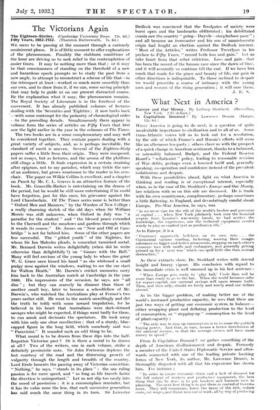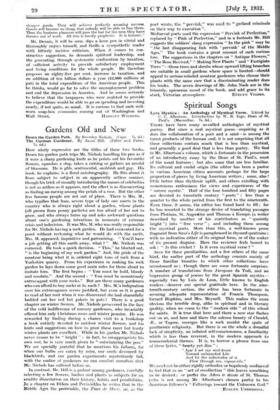What Next in America ?
WitAT America is going to do next, is a question of quite incalculable importance to civilization and to all of us. Some trans-Atlantic voices tell us to look out for a revolution, by the side of which France's and Russia's efforts will seem like an afternoon tea-party ; others cheer us with the prospect of a quick change in American sentiment, thanks to a balanced, or ostensibly balanced, Budget, and the Federal Reserve Board's " reflationist " policy, leading to reasonable revision of War debts, perhaps even a lowered tariff and, generally speaking, co-operation and confidence instead of the prevalent isolationism and despair.
With these possibilities ahead, light on what America is
thinking and reading is of exceptional interest, especially when, as in the case of Dr. Stoddard's Europe and Our Money, her relations with us on this side are discussed. Ile is frank with his own countrymen, complimentary, perhaps somet bites a little flattering, to England, and devastatingly candid about Europe. Pre-War America, he says, was "in no sense ripe for the Hie of the world's banker and purveyor of capital . . . when New York jubilantly took over the financial sceptre from London's war-weary hands, we had neither the knowledge, the ex-perience, nor the technical equipment needed wisely to play so exalted (yet so perilous) a role."
As to Europe, it is a
" Continent apparently hell-bent on its own ruin . . . the Continental nations snarling, bickering, wasting their meagre substance on bigger and better armaments, stepping on each other's economic toes with tariffs and embargoes, and generally getting primed up for a ' next war ' which can spell little else than mutual destruction."
As these extracts show, Dr. Stoddard writes with shrewd insight and breezy vigour. His conclusion with regard to the immediate crisis is well summed up in his last sentence :
"When Europe gets ready to • play ball,' Uncle Sam will be more than ready to go to the bat. When tho world becomes safer for export-capital, our national savings will again stream forth. Then, and then only, should we freely and wisely send our dollars abroad."
As to the bigger problem, of making better use of the world's increased productive capacity, he sees that there are
just two ways of getting our economic system in balance— either scrapping plant and deflating production to the level of consumption, or " stepping-up " consumption to the level of plant-capacity :
" The only way to step up consumption is to increase the public's buying power. And that, in turn, meats] a better distribution of the national income, so that the average citizen will have more money to spend."
From Is Capitalism Doomed ? we gather something of the depth of American disillusionment and despair. Formerly
a member of the United States Diplomatic Service and after- wards connected with one of the leading private banking forms of New York, its author, Mr. Lawrence Dennis, is thoroughly disgusted with all that his experience has shown him. For instance :
" In order to insure economic chaos and a lack of demand for the full output of workers and productive equipment, the best thing that can be done is to put bankers and business men to planning. The next bent thing Is to put them in control of Govern. meat. They will economize, lower the taxes of the rich, reduce costs, cut wages, and throw men out of work, all by way of producing
cheaper goods. They will achieve perfectly amazing success. Goods will become so cheap that nobody will be able to buy them. Then the business planners will pass the hat for the men they have thrown out of work. All this is hardly prophetic. It is historic."
Mr. Dennis, it will be seen, dips a keen pen in vitriol and thoroughly enjoys himself, and thrills a sympathetic reader with bitterly incisive criticism. When it comes to con- structive suggestion, he demands spiritual leadership, and the generating, through systematic confiscation by taxation, of sufficient activity to provide satisfactory employment and living conditions for the whole people. He therefore proposes an eighty-five per cent. increase in taxation, and an addition of ten billion dollars a year (12,000 millions at par) in the total expenditure of the American people. This he thinks, would go far to solve the unemployment problem and end the depression in America. And he seems seriously to believe that the taxpayers who were mulcted to provide the expenditure would be able to go on spending and investing nearly, if not quite, as usual. It is curious to find such well- worn soap-box economics coming out of Washington and







































 Previous page
Previous page